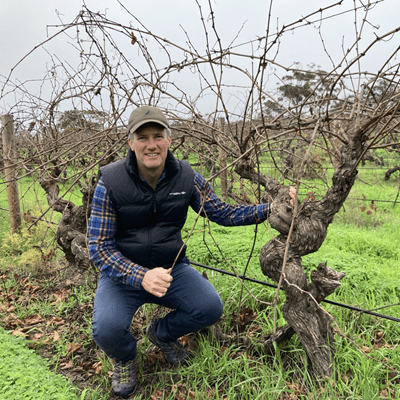Tell us in a few sentences about your experience as a viticulturist, how did you arrive here?
My first decade in the vines of Margaret River took me from the farming operations of pruning and tractor driving across many vineyard sites in the region, through to technical services, training delivery and vineyard management. One of my first projects at Juniper when I began as Viticulturist in 2008 was an Environmental Stewardship collaboration with the local Catchment Group. This included the fencing off & rehabilitation of the creek line on two of our properties and the control of exotic weeds. Seeing the transformation of these areas has been an ongoing inspiration for me to do more.
Juniper is a family wine business with custodianship of three vineyard properties in Margaret River. We have a total 40ha of vineyard and 60ha of land outside of this, including a winery and cellar door.
Why did you decide to apply to be an EcoGrower, was there something specific that influenced your decision and/or had you attended a previous EcoVineyards session?
Environmental sustainability and, improving our biodiversity are a current priority for the business. From attending an early EcoVineyards session in Margaret River I could see the project matched what we wanted to get cracking on, offering great expertise and an attractive funding contribution to boot!
Has there been a defining moment or catalyst for you to move towards more ecologically driven viticultural practices?
Our movement into sustainability has been a gradual process over the past decade which has included activities such as:
- Fence off creek lines from stock and revegetated these degraded areas.
- Eliminated herbicide use since 2010.
- Transitioned to organic fertiliser and fungicide programs since 2012.
- Eliminated single use plastics in the vineyard such as pruning vine ties and synthetic twine for training up vines.
- Seeding of mid rows to a diverse multi species seed mix to encourage biodiversity.
- SWA certified vineyard and winery from 2023 vintage.
Can you provide a brief overview of your project ideas, and what you wish to achieve over the 3 years and why is this important to you?
Our overall aim is to support the biodiversity across our property/s and surrounding environment – in the soils, vines and remnant bush and waterways. The final activities are yet to be finalised, however some ideas we have are:
- Mapping of biodiversity status of the property.
- Use of compost extracts to increase biodiversity in soil.
- Use of regionally specific ground covers.
- Identify and encourage microbat communities in the vineyard.
Planting of endemic, insect attracting species alongside and within the vineyard.
Where do you see grape growing in the future, do you feel there is an urgency to change current practices? If so, why?
Absolutely!
We feel there is an immediate urgency to play our part as landholders by supporting resilience of the living environment and to provide refuges for insects and other biota to ride-out the extreme climatic events forecast for the future. These practices will only strengthen the capacity of our vineyards to meet the challenges presented by climate change.
What else would you like to share with the broader EcoVineyards community, what gets you excited about the future?
We are grateful for the opportunity to collaborate with the EcoVineyards expertise and passion across the projects network, to share knowledge and energy and to keep pushing to do things better.
I am excited at the thought of discovering the range of biodiversity we have out in the vineyard, improving our practices to enhance this and to be able to share our journey with everyone – the EcoVineyards community, the Juniper team and all our customers.

